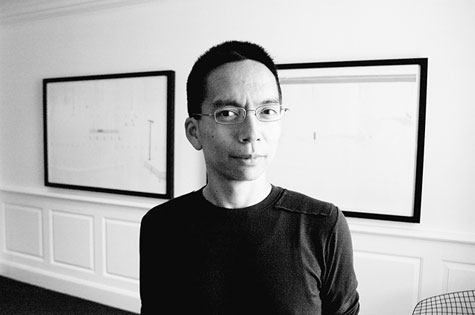
UNDER FIRE Maeda. |
John Maeda arrived at the Rhode Island School of Design a year ago pledging a different sort of leadership.The new president promised to be open and accountable. And while he would push the new, Maeda suggested, he would respect the old on a campus that has a deep reverence for tradition.
The president has had some success. He blogs. He tweets. Encourages on-line critique. Supporters say Maeda, a pioneer in digital design, has spawned innovation on the RISD campus and beyond.
And the president, whatever his affinity for the computer, has made clear his appreciation for what he calls "dirty hands" — the filthy work of painting and ceramics and furniture design that has been at the center of the RISD education for decades.
"People don't want technology anymore," he said, in an interview with the Phoenix in May. "They want humanity again."
But the recent uproar over the resignation of RISD Museum Director Hope Alswang, widely believed to have been forced out as part of a broader reshuffling of the administration, suggests there are limits to Maeda's brand of non-traditional leadership.
Critics say those limits are self-imposed: Maeda has not been as open as he should about the departure of Alswang and a string of top-level administrators who have left the campus in recent months.
Just last week, 19 of the museum's 30-member board of governors sent a letter to RISD's board of trustees expressing "shock and bewilderment" over Alswang's departure and the lack of communication surrounding the move.
But if Maeda could do better in explaining his vision for the school, the recent turmoil points to a larger reality: there are institutional checks on an open leadership. Checks that the president, himself, is discovering. Checks that he tried to explain, with mixed success, at a closed-door meeting with more than 300 faculty, staff, and students this week.
"Transparency means the ability to see everything," Maeda said, in remarks provided by his office. "This is something that I know is intrinsic to the ethos of an academic institution, and as president, it's my job to safeguard and uphold this academic freedom. And yet even in the academy, there is a need for privacy. Issues regarding how a promotion case went for a faculty member, or for why a staff person has left, or the grades of another student — these are all private matters that the institution has a responsibility to keep private."
That sort of explanation, however reasonable, is bound to be less-than-satisfying on a close-knit campus dealing not only with upheaval in the upper ranks, but with the sort of financial trouble afflicting nearly every center of higher education in the country — trouble that yields layoffs and anxiety and mistrust.
And a staff shake-up — if not all that unusual under new leadership — is bound to come into conflict with a pledge to respect the traditions of a tradition-bound institution; bound to raise concerns about the loss of institutional memory and the direction of the school.
It is going to be a challenging year on the RISD campus. There is lingering financial trouble, a major strategic planning initiative on the horizon, and a faculty contract to be negotiated in the spring.
There is some healing to be done. And a leadership model — intriguing and imperfect — to be refined.